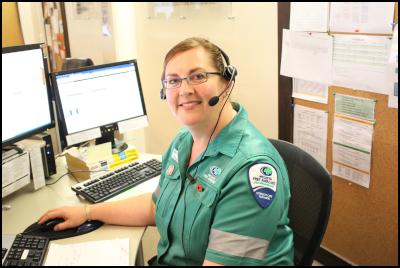Hearing impairment no barrier to saving lives
Hearing impairment no barrier to saving lives

Hearing impairment
doesn’t stop Wellington Free Ambulance paramedic Bronwyn
Dunlop saving lives.
Bronwyn is a clinical advisor on the clinical support desk in the 111 communications centre, providing clinical advice to the call takers, ambulance dispatch staff, and road crew paramedics.
She was born with moderate to severe congenital nerve deafness, which means she suffers 80 to 90 percent hearing loss. However, this never stopped Bronwyn following her dreams.
“It was pretty early on that I realised I wanted to be in a job where I could help people,” she says.
“Then, during my twenties, I had my first opportunity to work with a volunteer ambulance crew.”
Bronwyn began training towards a National Certificate in Paramedicine, and it wasn’t long before she decided that was the career for her.
“My proudest moments were gaining my Bachelor of Health Science in Paramedicine and Post-Graduate diploma in Specialty Care,” she says.
“People with hearing impairments have to work harder than others – especially in learning word meanings and pronunciations.”
This hard-working attitude paid off for Bronwyn, who landed her dream job as a full-time paramedic with Wellington Free Ambulance in 2000.
Bronwyn says when having a conversation, the biggest hurdle for the hearing impaired is background noise. This could be a real problem for paramedics who deal with people talking, sirens, helicopters and radio chatter – all while working to save a patient’s life. However, this is no barrier to Bronwyn providing a professional service.
“I have never let my hearing be a barrier in any part of my life,” she says.
“Hearing technology has improved so much from the first little box I wore around my neck with cables, to having aids with modes that can be set to conversation, background noise control, and movie – so I can hear all the music effects.
“In my current role, I’m actually a second pair of ears and eyes to those working with patients.”
Bronwyn has access to extra tools to help her do her job, including a stethoscope with an amplifier to hear heart and lung sounds when she’s working as a paramedic on the road, as well as a Bluetooth receiver and microphone for her colleagues to wear so that she never misses crucial information about what’s happening with the patient.
“I am passionate about what I do – I can make a difference to someone else’s life each day by using the skills I have learnt and drawing on past experiences,” says Bronwyn.
“Since I became a paramedic, I haven’t looked back.”
ends


 Gordon Campbell: On Why We Can’t Survive Two More Years Of This
Gordon Campbell: On Why We Can’t Survive Two More Years Of This NZ Government: Drive Safely This Summer
NZ Government: Drive Safely This Summer Northland Inc: Game-Changing Investment For Northland - Resilience Fund Allocates $250,000 To Health Simulation & Training Centre
Northland Inc: Game-Changing Investment For Northland - Resilience Fund Allocates $250,000 To Health Simulation & Training Centre Interchurch Bioethics Council: Church Bioethics Agencies Express Dismay at the Rushed Consultation Period for Submissions on the Gene Technology Bill
Interchurch Bioethics Council: Church Bioethics Agencies Express Dismay at the Rushed Consultation Period for Submissions on the Gene Technology Bill New Zealand Police: More Than $2.5m Worth Of Assets Restrained In Undeclared Tobacco Case
New Zealand Police: More Than $2.5m Worth Of Assets Restrained In Undeclared Tobacco Case SPCA: Survey Shows Government Lacks Mandate To Repeal Live Export Ban
SPCA: Survey Shows Government Lacks Mandate To Repeal Live Export Ban Peace Action Ōtautahi: Bridge Of Remembrance Peace Protest
Peace Action Ōtautahi: Bridge Of Remembrance Peace Protest


